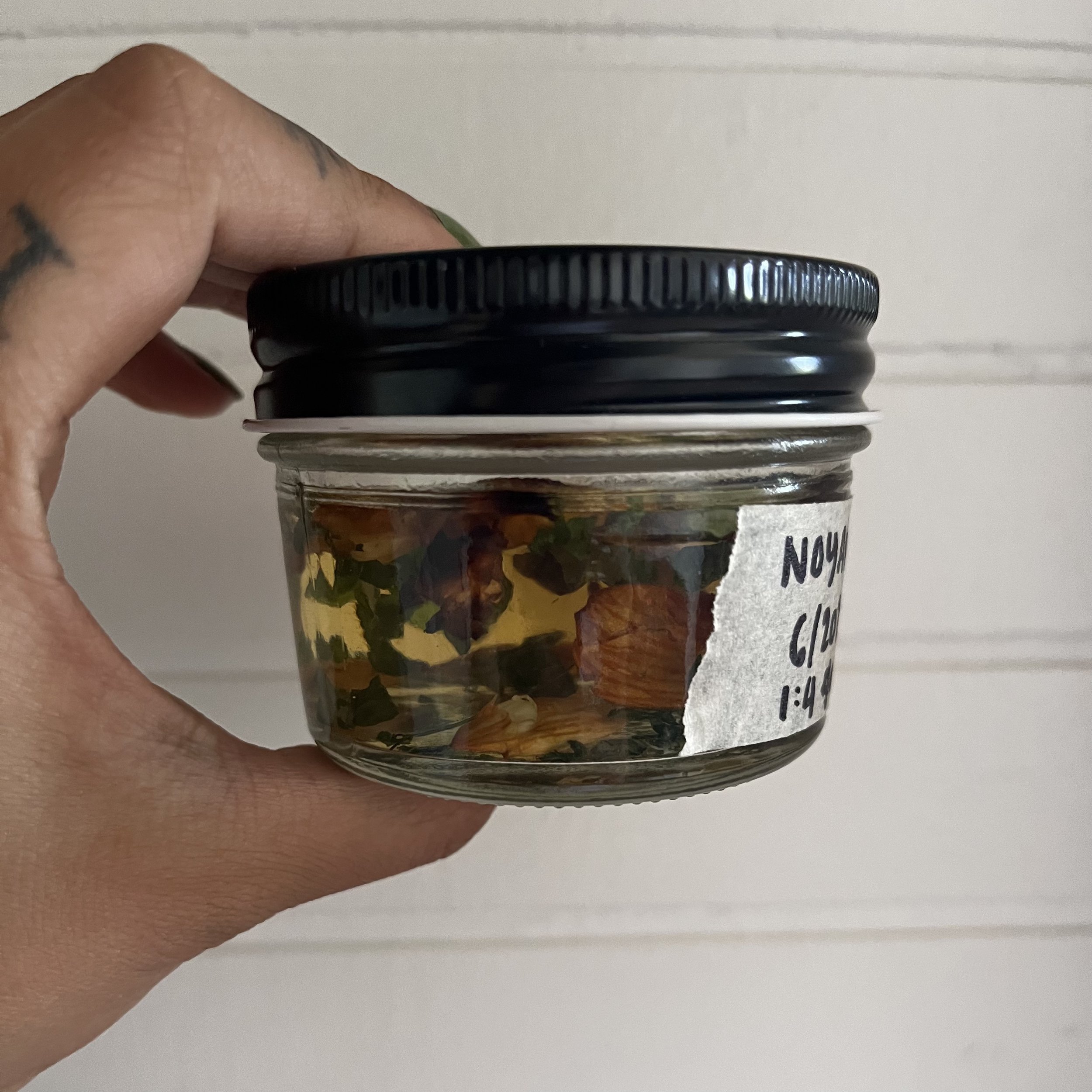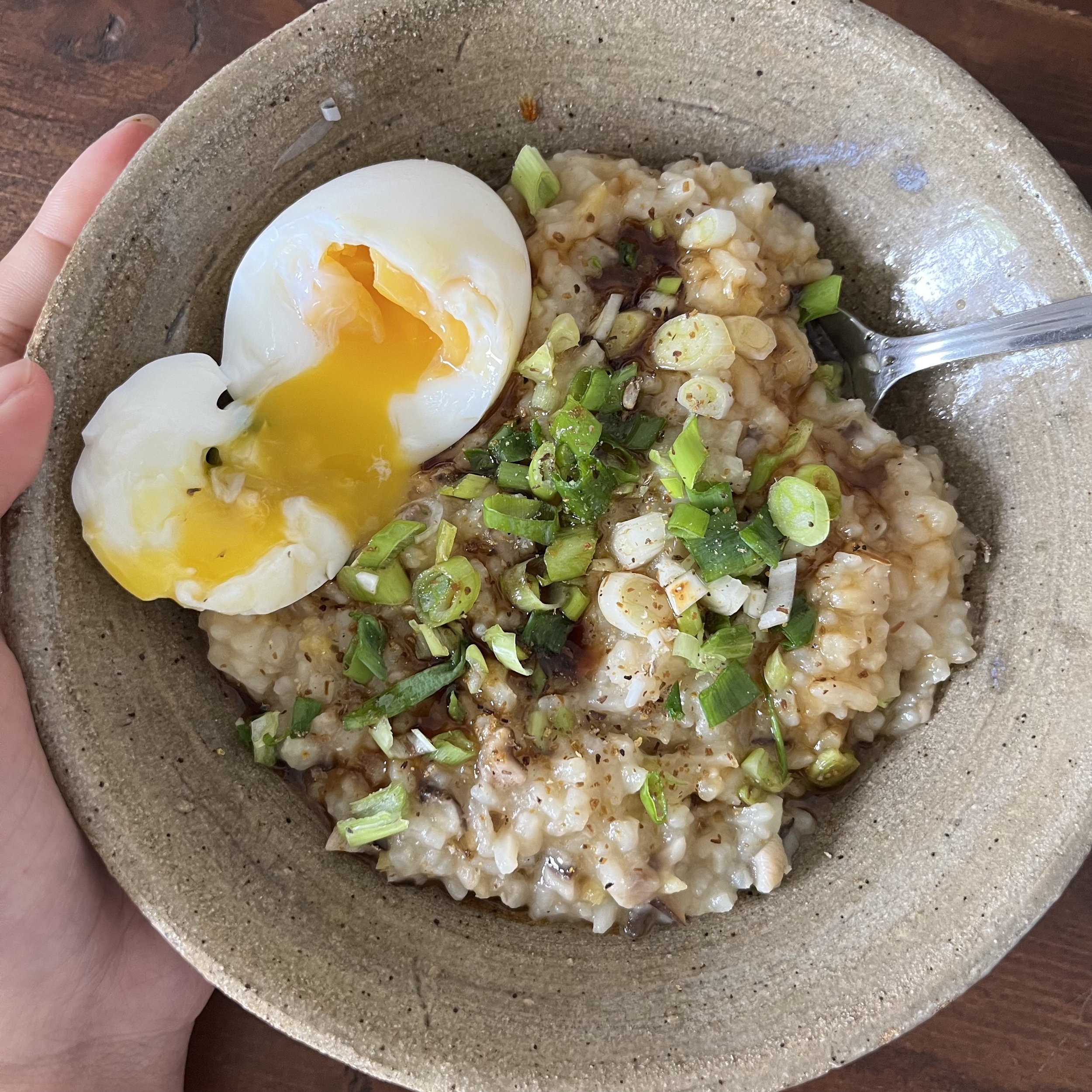Herbal call to action: Boycott, Divestment, Sanctions
Above: Noyaux made with toasted peach kernels and fragrant bedstraw, a common plant who grows along woodland trails. This Noyaux will be used in small amounts in baking as a substitute for almond extract.
Uprooting to a small city is giving me some space to observe the ways I’ve normalized the consumer marketplace, conflating what’s convenient with what’s in season in different aspects of my life. I feel audacious with my cravings for what I don’t have, what I “need” to do my life’s work.
Above: Nettle blanch water often gets dumped but contains an earthy and slightly salty microdose of the rich nutrients from the now non-stinging leaves.
Market trends in herbalism have devastating effects on the land, and we who call ourselves herbalists have a duty to question what is being sold to us. Herbalism is having a moment right now - picture a high resolution photograph of baskets full of bug-free bouquets next to a perfectly placed adaptogenic moon milk. I’ve seen the image so many times it’s a meme in my mind. I've also recreated it. But even in my short time on earth so far, herbalism was not always so romanticized or so sterile.
Above: Corn silk tea is a sweet and gently stimulating diuretic made from hairs collected from a corn cob. I couldn’t resist making braids but it’s better to chop up the silk before steeping in a cup of hot, just-boiled water for at least 20 minutes.
The “herbalism” I grew up with was food as medicine - my neighbor’s grandfather’s advice to go into the kitchen and swallow a clove of garlic everyday. It was 3 generations of women in a tiny bathroom leaning over a pot of hot water to breathe the steam, blowing our noses into toilet paper - sometimes an herbalism with no herbs at all. It was my farmer friend cheering a wasp eating a tomato hornworm. It was a creative, messy, cheap, and collaborative way to be with the earth and their creatures and their elements and keep surviving together.
Above: Dehydrated and powdered fire cider marc adds spice to this bowl of mushroom lugaw - a simple grounding rice porridge.
Recently on the blog I shared a short intro on the Palestinian call for Boycott, Divestment, and Sanctions. The BDS movement is spreading, and as we withhold resources from targeted corporations that contribute to genocide, we’re quickly seeing these same corporations run ads and sales to bring customers back. It’s all too convenient, and at what cost?
From herbalists for a Free Palestine:
"Israeli" agriculture has been used as a tool of ethnic cleansing & ecocide since the establishment of the ethnofascist state. Not only does it benefit from Palestinian displacement, but it also funnels money to a government that has been continuing its military assault on the entire region, including Palestine, Lebanon, Syria, and beyond. The goal of the zionist project is to eradicate Palestinians and settle their land, which we are seeing clearly with the violence in Gaza and the continued land theft in the West Bank, where 18 villages have been ethnically cleansed since October 2023 alone. Further, Zionist agriculture systems have had a massive ecological impact, including loss of biodiversity, desertification of land, and intentional destruction and overuse of a limited water supply.
Above: English ivy "laundry detergent" is a new one for me, but so far things are going well! English ivy is an invasive plant that climbs and roots through trees and other homes - they contain saponins that make for a sudsy, antimicrobial wash cycle.
Take action:
To follow up from my last share about the Boycott Mountain Rose Herbs campaign, which has been ongoing since 2015, here are more updates along with contact information to connect with a few large herb distributors that currently support "Israeli" agriculture and/or actively contribute to the over-harvest and misuse of indigenous ceremonial plants.
These are some of the first herb distributors to show up in a quick online search for many medicinal herbs - so it would be easy to find yourself sourcing from them. But if you currently buy from any of these companies, it's time to stop. And the next thing to do is put these call scripts to use.
Frontier Coop (including Simply Organic, Aura Cacia, and Co-op Market) are not currently selling any “Israeli” herbs according to their 2023-2024 catalogue. However, they still sell other items from “Israel” like calcium citrate, magnesium citrate, Dead Sea salt, jojoba oil.
Contact Frontier Coop: 1-844-550-6200 / customercare@frontiercoop.com
Mountain Rose Herbs has “paused” on purchasing any new “Israeli” products and are currently selling the rest of their stock. Still sells Indigenous ceremonial plants even after being asked to stop
Contact Mountain Rose Herbs: 1-800-879-3337 / support@mountainroseherbs.com
Starwest Botanicals are not currently selling any “Israeli” herbs according to their 2024 catalogue. However, they still sell various “Israeli” salts.
Contact Starwest Botanicals: 1-800-800-4372
Gaia Herbs is currently selling “Israeli” black seed oil and potentially more items. We have yet to communicate with them.
Contact Gaia Herbs: 1-800-831-7780 / info@gaiaherbs.com
Let’s do it together:
Join me on Patreon for virtual co-working and support around BDS in herbalism.





